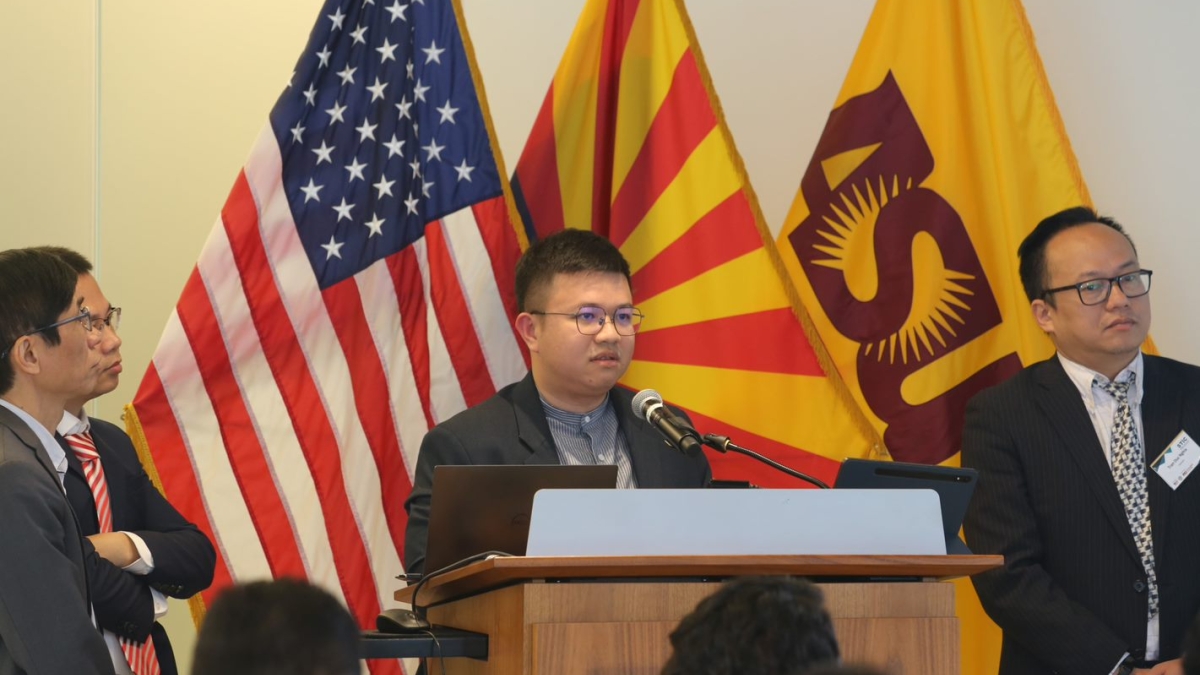ASU kicks off cybersecurity study tour to strengthen US, Southeast Asia ties

The United States-ASEAN Science, Technology, and Innovation Cooperation Program’s study tour, which kicked off on March 20, is an intensive one-week program that includes panel discussions, working sessions, site visits and workshops with leading industry, government and academic experts. Photo courtesy ASU
Cybersecurity policymakers and experts from the Association of Southeast Asian Nations, or ASEAN, joined together in Washington, D.C., on March 20 as ASU kicked off the United States-ASEAN Science, Technology, and Innovation Cooperation (STIC) Program's study tour.
The tour is an integral part of the STIC Program, which aims to strengthen science, technology and innovation cooperation between the U.S. and the ASEAN members.
The intensive one-week program included panel discussions, working sessions, site visits and workshops with leading industry, government and academic experts. The focus of the cybersecurity study tour is to promote collective action around policy, best practices related to incident response and the adoption of shared standards and capacity-building strategies to foster a secure, interoperable and resilient cyberspace in the ASEAN region. The tour also offered attendees the opportunity to network with other professionals in the field and gain valuable insights on how to build on existing achievements.
The tour comes on the heels of the U.S. Department of State’s awarding $3 million to ASU to implement the STIC Program. The three-year program focuses on three major activities: a U.S.-based science, technology and innovation policy study tour in Washington, D.C.; an online portfolio of upskilling content through a Virtual Talent Mobility Portal; and an annual regional conference with technical and innovation tracks and grant competitions for research, publishing and venture creation.
The first regional conference will take place in Indonesia or Singapore later this year. The program will strengthen and increase national and regional cooperation of ASEAN members and the U.S. government on federal, local, private-sector and academic levels. It will also help develop and implement policies to foster science, technology and innovation through increased funding, data sharing, intellectual property generation, commercialization and academic research partnerships.
Liesyl Franz, who is currently the acting deputy assistant secretary for international cyberspace security at the State Department, welcomed tour participants to Washington .
“You are leaders who are well positioned to advance global efforts to promote international security, stability and freedom in cyberspace,” Franz said.
Franz’s spoke about current cybersecurity challenges facing the ASEAN region and the steps that are being taken to address these challenges, helping study tour participants understand the importance of collaboration, best practices and rules-based multilateral cooperation in order to create a safer and more secure cyberspace.
“ASEAN and the United States will face significant challenges in cyberspace, and we must work together to address ongoing and emerging challenges of the digital age,” Franz said. “We are committed to working closely with our ASEAN partners. We can work collectively to improve and sustain and preserve our international cyber-civility.”
The weeklong tour included site visits to the Indonesian Embassy, Amazon and the Software Alliance. It also featured panels and workshops to promote collective STIC ecosystems, including policy advising, drawing, investment, enhancing university and research institutes’ impact, incubating start-ups and reskilling the workforce. Participants visited ASU’s Decision Theater and saw firsthand how collaborative engagement in the pursuit of comprehensive, useful, data-driven models can solve complex challenges.
Earlier in the week, STIC Program Director Jose Quiroga shared details with tour participants on the STIC Virtual Talent Mobility Portal, a cutting-edge platform to upskill and gain valuable expertise in priority areas for the ASEAN region through courses in partnership with Coursera.
“These are courses that are specific to the academy. We want to see more people across ASEAN working together and with the United States. We've partnered with Coursera to program and curate courses in three learning tracks,” Quiroga explained.
The three tracks are:
- The Science and Technology Track, which will leverage programming offered by U.S. universities through Coursera and will include six technical academies. Each year, participants will be invited to submit research concepts and 35 will be selected to present at the annual conference, where $150,000 will be awarded in research grants.
- The Entrepreneurship and Innovation Track taps the 100 Million Learners initiative from ASU’s Thunderbird School of Global Management. Each year, 35 participants will be competitively selected to join an online business venture incubator program and pitch competition, where $150,000 will be awarded in seed funding.
- The Industry Recognized Credentials Track will include content from companies like AWS, Google, Oracle and Microsoft. This track will provide certification courses for skills that are in high demand such as cloud computing, artificial intelligence, machine learning, cybersecurity and more.
More Science and technology

ASU to host 2 new 51 Pegasi b Fellows, cementing leadership in exoplanet research
Arizona State University continues its rapid rise in planetary astronomy, welcoming two new 51 Pegasi b Fellows to its exoplanet…

ASU students win big at homeland security design challenge
By Cynthia GerberArizona State University students took home five prizes — including two first-place victories — from this year’s…

Swarm science: Oral bacteria move in waves to spread and survive
Swarming behaviors appear everywhere in nature — from schools of fish darting in synchrony to locusts sweeping across landscapes…

